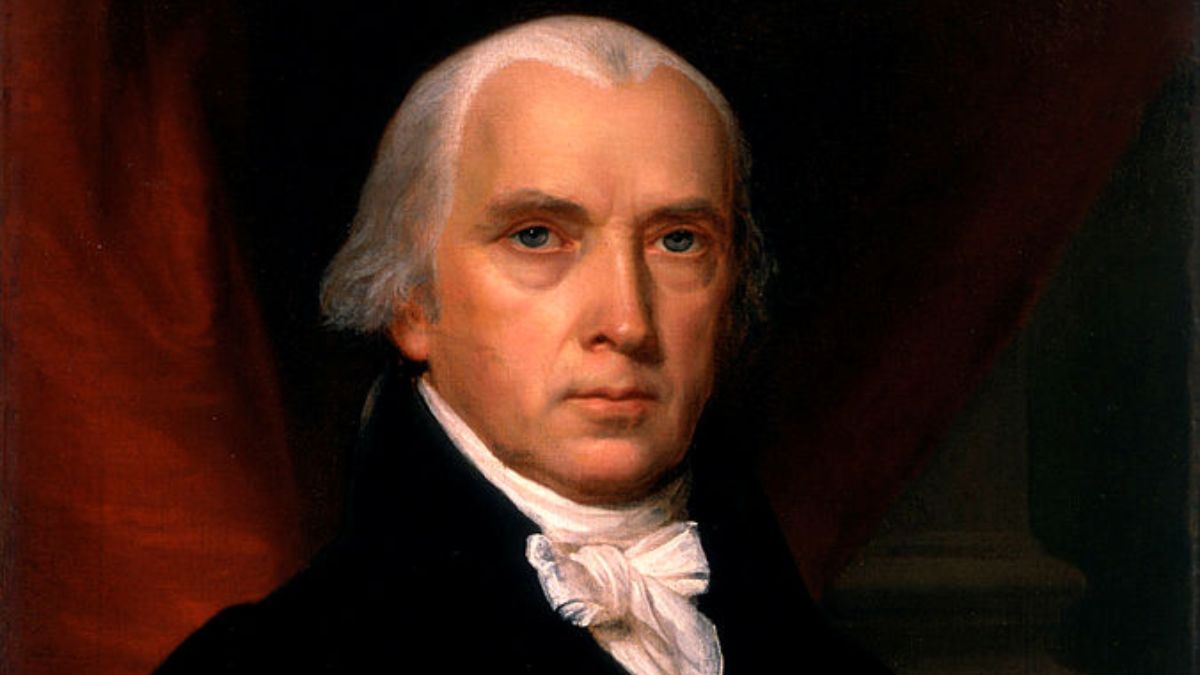Editor’s Note: This profile is part of a series taking a closer look at US presidents ahead of the 2024 presidential election between Donald Trump and Kamala Harris.
James Madison, the fourth president of the United States, is best remembered as the “Father of the Constitution” and for his leadership during the War of 1812.
As a key figure in the founding of the nation, Madison played a central role in drafting and promoting the US Constitution and the Bill of Rights.
His presidency, although marked by economic difficulties and foreign challenges, cemented his legacy as a crucial figure in shaping the early Republic.
Madison’s life & career
James Madison was born on March 16, 1751, in Port Conway, Virginia, into a wealthy plantation family.
He was educated at the College of New Jersey (now Princeton University), where he excelled in classical studies and philosophy. Madison’s political career began in Virginia, where he became an influential figure in the state’s revolutionary government and served in the Continental Congress during the American Revolution.
Madison’s role in drafting Virginia’s constitution and his deep commitment to individual liberties foreshadowed his later contributions to the national stage.
In the 1780s, he emerged as a leading advocate for a stronger central government, believing that the weak Articles of Confederation threatened the young nation’s survival.
The Constitution and the Bill of Rights
James Madison’s most significant contribution to American history came in 1787 when he played a pivotal role in the drafting of the US Constitution.
He arrived at the Constitutional Convention in Philadelphia with a clear vision for a new framework of government, emphasising checks and balances, federalism, and the separation of powers. His influence was so profound that he is often called the “Father of the Constitution.”
Madison also contributed to the ratification of the Constitution by co-authoring the Federalist Papers alongside Alexander Hamilton and John Jay.
These essays argued for the adoption of the Constitution and remain some of the most important writings on American political philosophy.
After the Constitution was ratified, Madison served in the first US Congress and took a leading role in drafting the first ten amendments, known as the Bill of Rights, which guaranteed individual liberties such as freedom of speech, religion, and the press.
Madison as US Secretary of State
In 1801, Madison became Secretary of State under US President Thomas Jefferson, his close friend and political ally.
Madison’s tenure as US Secretary of State was dominated by issues related to foreign policy, particularly the conflicts between Britain and France that affected American trade and shipping. The British practice of impressment, forcibly conscripting American sailors into the British navy, became a major source of tension.
Madison worked with Jefferson to implement the Embargo Act of 1807, which aimed to force Britain and France to respect American neutrality by banning all US trade with foreign nations.
The policy, however, backfired and caused significant economic harm to American merchants and farmers. Despite this failure, Madison remained a key figure in Jefferson’s administration and was elected president in 1808.
Madison’s presidency and the War of 1812
James Madison’s presidency (1809–1817) is most remembered for the War of 1812, a conflict that tested the young nation’s ability to defend its sovereignty. Tensions with Britain over trade restrictions and impressment continued to grow during Madison’s first term, and in June 1812, he asked Congress for a declaration of war.
The War of 1812 was marked by a series of military defeats and victories. The British successfully burned Washington DC, in 1814, forcing Madison and his wife, Dolley Madison, to flee the White House.
However, American forces achieved significant victories, including the defence of Fort McHenry in Baltimore, which inspired the writing of “The Star-Spangled Banner,” and Andrew Jackson’s triumph at the Battle of New Orleans in 1815.
Despite the mixed results of the war, Madison’s leadership helped restore national confidence.
The Treaty of Ghent, signed in December 1814, ended the war without resolving many of the underlying issues but reinforced American independence and increased national unity.
The post-war period, known as the “Era of Good Feelings,” saw the decline of the Federalist Party and the dominance of Madison’s Democratic-Republican Party.
Policies of Madison
Domestically, Madison’s presidency saw economic challenges and efforts to rebuild the nation after the war. He supported the creation of the Second Bank of the United States in 1816 to stabilise the post-war economy and foster economic growth.
He also pushed for internal improvements, such as roads and canals, to promote national development.
Although Madison had initially been a strict constitutionalist who opposed expansive federal power, his experiences as president led him to adopt more pragmatic views, supporting policies that strengthened the federal government when necessary.
This evolution in his political thinking demonstrated his willingness to adapt to the nation’s needs.
Later years & Legacy
After leaving office in 1817, Madison retired to his estate, Montpelier, in Virginia, where he remained an influential figure in American politics. He advised his successors and played a key role in the debates over slavery and sectionalism that began to intensify during the 1820s and 1830s.
Madison continued to advocate for the principles of the Constitution and warned against the dangers of disunion.
Madison also became involved in managing the University of Virginia, which had been founded by his friend Thomas Jefferson, and he served as the university’s rector. He remained active in public life until his death on June 28, 1836, at the age of 85.
Madison’s legacy as a statesman and political thinker is immense. As the primary architect of the US Constitution and the Bill of Rights, he laid the foundation for American governance and civil liberties.
Madison’s contributions to the founding of the United States and his influence on its early development continue to shape American politics and law today.


)

)
)
)
)
)
)
)
)



